Interview with Director Alex Wolfgram on the Subject of Filipino Migrant Workers
by Brian Hioe
語言:
English
Photo credit: I Have It Maid
On January 7th, New Bloom’s Brian Hioe interviewed Alex Wolfgram, director of I Have It Maid, a documentary about runaway Filipino migrant workers in Taiwan. The documentary focuses the story of one migrant worker in particular, Vicky, but also more broadly details the process by which Filipino migrant workers come to Taiwan. The film can be seen online on I Have it Maid’s website.
Production Background of the Film
Brian Hioe: My first question is, what is the history that led you up to the production of I Have It Maid? First, what was it that led you to living in Taiwan and, second, what was it that led you to producing the film?
Alex Wolfgram: I came to Taiwan about six years ago and been here ever since. I came here originally on a scholarship from the Ministry of Education to do a three year scholarship, the first year was for Mandarin studies and the other two years was for a Master’s degree. So I did my graduate degree at National Chengchi University (NCCU), and focused on their Asia-Pacific studies.
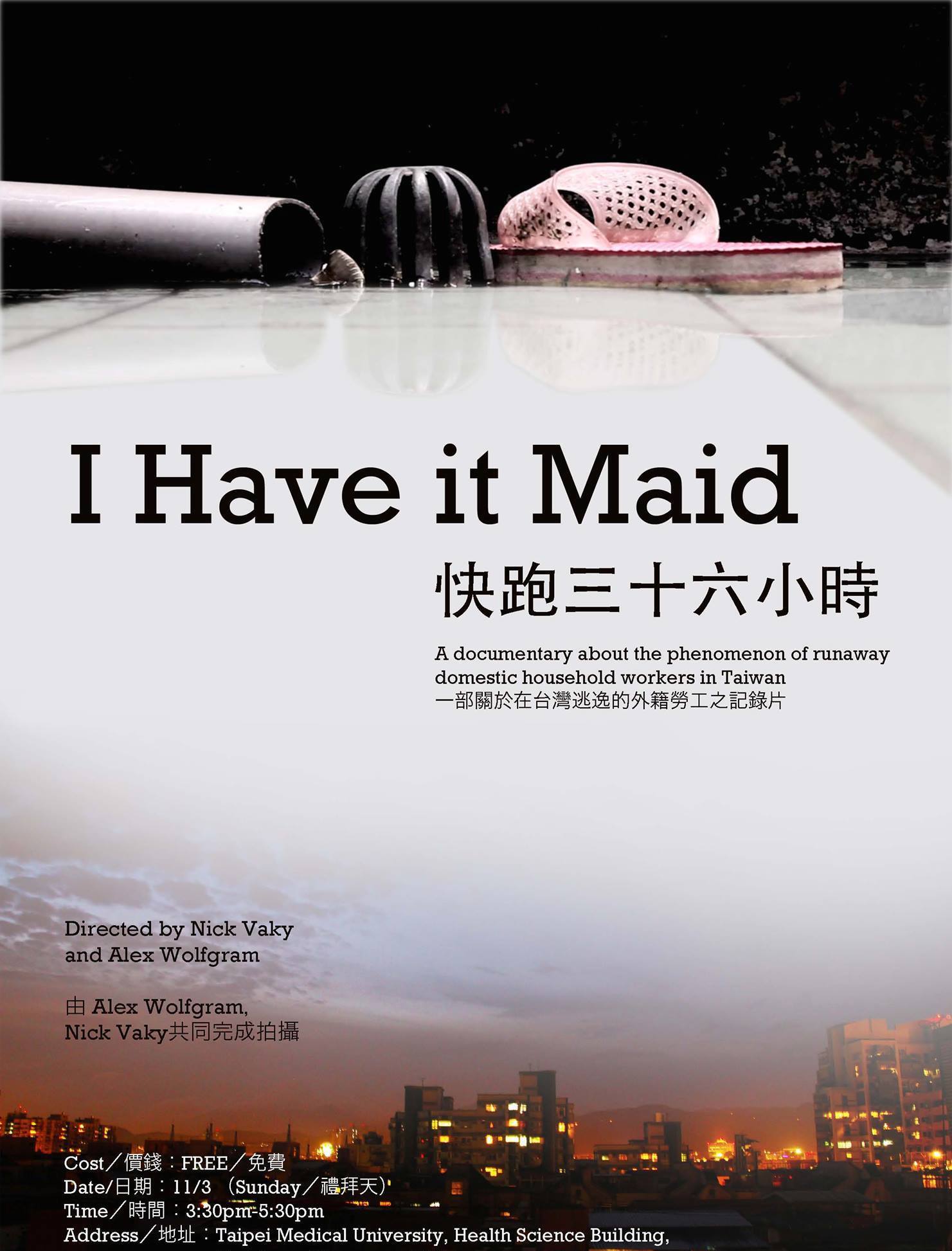 Poster for a screening of I Have It Maid. Photo credit: I Have It Maid
Poster for a screening of I Have It Maid. Photo credit: I Have It Maid
When I came over, I decided right away that the Asia-Pacific program at NCCU was what I wanted, because I wanted to focus more on Asia-Pacific diplomacy aspect of it. I thought the program was very unique. I wanted to go into diplomacy, this kind of thing, so I just automatically chose that school and that program for that need at the time, as it was the only one that had that program. I had applied to this program, keep in mind, because I saw the list of courses that were available, very specific courses that I couldn’t find elsewhere. When I got over here, I found half of them weren’t being offered anymore. Which I was pretty upset about. You know, you kind of move your whole life over to a place simply for these courses and whatnot and then you find they’re not being offered!
I quickly had to make a decision: What else could I get from this situation without getting too negative, giving up the scholarship, and wanting to go somewhere else? I started looking around my department, locally, and observing what influenced me the most at this point in time. And it dawned upon me, I had a lot of foreigner friends, and I knew a lot of Taiwanese people that were hiring foreigners. For some reason at the time, they were all talking about complications they had with working and how much they wanted to be in Taiwan, how much they wanted to stay and so forth, but it seemed like they were always running into loopholes. Taiwanese wanted to hire foreigners but because there were these high costs involving the government, they felt like they weren’t able to. So I started thinking about the relationship of foreign labor and Taiwan’s economy, which I was originally coming here to think about policy and so forth.
It just so happened I was living across from the Wanfang Hospital in Taipei, there was lots of Filipino and Indonesian hired workers around there. I would see them pushing wheelchairs around every day. One day, I don’t know what it was, I just sort of started paying attention more. And I would always see them come out in these big groups. You know how it goes, the garbage truck comes, and everyone goes outside. It was always them. I would go out too and throw out my garbage and start talking with them. I was always curious why did they all sort of come out at this time. It seemed like Batman coming out in the evening, it was very mysterious to me!
Then I got to know them and so many of them were very shy, which I wasn’t sure was a cultural thing or whatnot. But the more I got to know them, the more they got to talking about how they weren’t supposed to be talking to anybody. I thought, that’s weird, why’s that? And they started slowly to talk about their lives a little bit. I got to know a little bit of what’s going on with their situation and how they’re basically working on the clock 24/7.
I was kind of really surprised because, you know, I’m in this place that’s very altruistic and I know they have a hardworking culture, but why is this occurring? I started to hear more and more stories and they got worse and worse as they started opening up to me about sexual abuse, and how their phones and passports are missing. Whatever it may be, I felt compelled to research it more.
Out of a combination of things, it brought about a thesis, and research which was something I felt personally connected to and something that was more hands-on and not so academic. The film, “I Have It Maid” is actually based off my thesis, which is also called “I Have It Maid”, plus a very academic title after that. But when I was doing the research, I did conduct a lot of interviews so I thought, “Why don’t I bring a recorder? I can at least make a podcast of it or something.”
It just so happened at the time, I had met someone who was interested in doing a documentary, who was Nick Vaky, my friend and partner in this project. We just started talking and I said, “Yeah, I’m going to be doing all these interviews, I have my camera, and you have a camera, so why don’t we just sort of try to combine forces? I can get my research out of this and you can get some filming experience?” And he said, “Yeah, why not?”
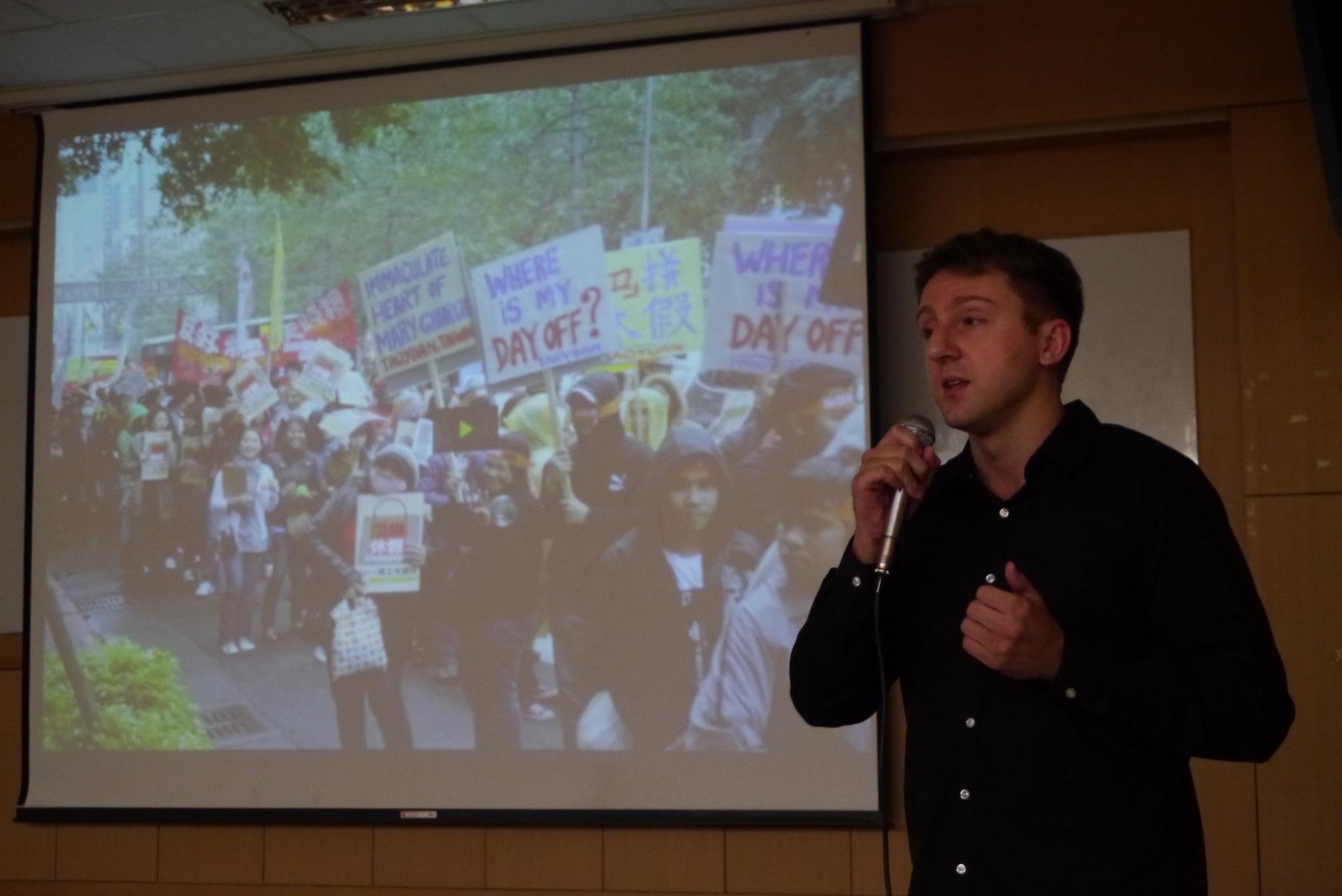 Director Alex Wolfgram at a screening of I Have It Maid at Taipei Medical University. Photo credit: I Have It Maid
Director Alex Wolfgram at a screening of I Have It Maid at Taipei Medical University. Photo credit: I Have It Maid
The rest is kind of history. We basically filmed for almost two and a half years. We were both in graduate school, our schedules were packed, and so we had to divvy it up. We basically assigned every single Tuesday morning and Sunday morning to going and filming. We mostly went around Taipei to different churches where we knew a lot of foreign workers were hanging out, because if they did have a day off, it was usually then that they would congregate. Filipinos being mostly Catholic, we would go to churches.
One of the reason we chose to focus on Filipinos is because they have the longest history of being in Taiwan among all foreign workers and also because there’s less of a language barrier. Even though we could speak Mandarin with them, they would open up more with foreigners in English. Also with my surroundings, I just met more Filipinos migrant workers in general.
We would go to these churches and one thing led to another, a lot of them worked with NGOs actually, and they talked about these different centers where they would house these different runaway workers. With the story, as we got to know more and more, things just kind of snowballed from there. It became quite broad, and we eventually sat down and focused on one person named Vicky. We decided to base it off her story in particular. That’s a little bit of the background.
Critical Responses from Film Festivals, Activist Organizations, and the Government
BH: So it seems like a project that kind of took off, originally, out of your academic research. But after you made the film, you were submitting to film festivals. What were the responses?
AW: We didn’t have much luck with film festivals. I don’t know why. We applied to quite a few, I think, like Taiwan-based documentary film festivals, even Urban Nomad. I don’t know. Our project is, I think, very specific. It is based off an academic work. Although we did try to make it as personalized as possible, which was why we chose to incorporate Vicky’s story, so that it wouldn’t be dry academic facts; we thought that we still were going to tell a story.
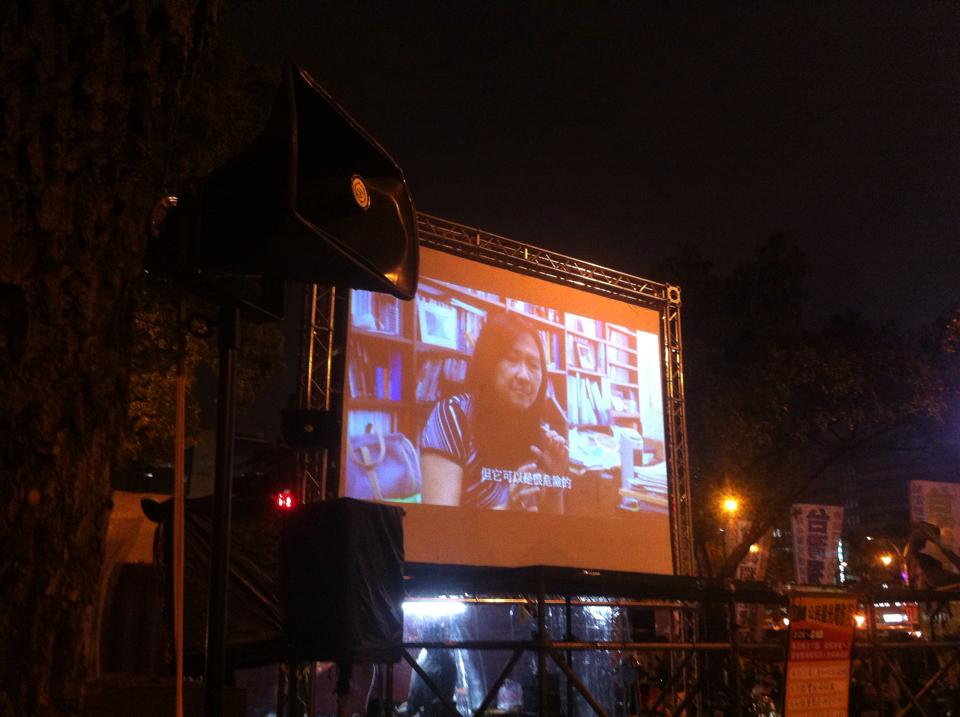 Screening of I Have It Maid outside of the Legislative Yuan encampment during the Sunflower Movement. Photo credit: I Have It Maid
Screening of I Have It Maid outside of the Legislative Yuan encampment during the Sunflower Movement. Photo credit: I Have It Maid
To be honest, I don’t know, for us, film festivals aren’t that important. The results are more important. We were hoping to get into them because we just wanted to get as much international exposure to the topic as possible. From a movie standpoint, I can’t say what was on the judges’ minds.
We had a lot of positive feedback from the organizations in film festivals who wanted to push it forward, just because of X, Y, or Z, it wasn’t fitting to their category. To give an example, the DVD company who produced “Beyond Beauty: Taiwan from Above,” they came to us actually and said, “We want to help you make DVDs.” They got in contact with me and about a month ago, we got our first set of DVDs. They gave it to us at cost-base, just really cheap, so we could at least make DVDs and get them out there.
So a lot of people have been coming forward. I’ve had schools calling me, or at least e-mailing me every week to do screenings. I’ve shown it to a lot of academics, including the ones that were in the film, and got positive feedback. For us, we’re very satisfied with it, for film festivals, it was kind of a lost cause.
BH: Who are you showing the film to so far? Taiwanese audiences? Foreigners in Taiwan? Groups abroad? You mentioned different organizations, for example, as well as to academics.
AW: Right now it’s mostly been schools, it’s been universities, it’s been different NGO organizations. We just got the DVD out and we put the film up on YouTube a few months ago. Since then, it’s been crazy busy. After we put it out, we put it online, we made our announcement, and we sent it off to all the people who were involved and interviewed by us.
Basically, we’ve just been spreading it slowly using those means. Going to 2015, my first priority for this film is to bring a DVD of the film to the government organization, the Council of Labor Affairs (CLA), that we interviewed, and to show them. I’ve sent it to them before. I know they’ve seen it and that things are already starting to pick up as a result, or at least I hope so. Just for trends that are occurring, it seems like a lot more reporters are talking about the topic. We actually had multiple reporters from the Apple Daily, as well as some other magazines that interviewed us.
We want to spread naturally and I want to push it as much as I can, but this type of topic, people can only get so much concerned about because it doesn’t affect them personally. With many Taiwanese, we’re trying to awaken them to an issue which we do believe does hit them at heart when they don’t believe or recognize that it does. That’s the biggest challenge right now. If you want to recommend this film to someone who then commits to watch it, you have to give them a reason and I think that just by letting it spread naturally like this is kind of the best way at this point.
BH: What have been reactions from people who have seen the film to date? I know that you showed the film outside the Legislative Yuan during the Sunflower Movement.
AW: Oh, we were actually just walking by, curious about what was going on. They had a projector screen set up and we were sort of just like, “Hey, we have this film, would you be interested?” And they were like, “Yeah, of course!” That’s literally what happened.
The next thing we knew, they invited us back, I think, the next day or so, and we did a screening. That was probably one of our biggest crowds! And it’s funny, you know how it works, you do all this work to get a school to set up an auditorium, and check people in. It takes a lot of work, but this just randomly happens.
BH: How did people react there?
AW: I think they reacted pretty well to it in the sense. I feel that with this topic, a lot of people aren’t aware of it as a problem to begin with. Like it’s something people know, that these workers are running away, but nobody really knows why. It depends. Like if you have some academic professors, they might be talking about these issues. But when they start seeing these stories in the film, they’re like, “Oh my goodness, I had no idea.”
Usually when I sit in an auditorium with different students or whatever and I kind of observe their reactions, they always seem surprised or shocked. Especially in the documentary when we caught people lying pretty much directly to our faces about these workers, or how they go around and cut corners and so forth. I think it’s a lot it take in. It’s a bit of a shock factor.
BH: That makes sense. Largely, it doesn’t seem like that much of a well known issue, even among the different social issues that people are concerned with.
But were there any reactions in particular to the fact that you showed the different sides of the process for migrant workers to come to Taiwan? You know, interviewing government officials, also going to the Philippines, and such.
AW: Yeah, I mean everyone feels that part is really necessary to show, to show the loopholes in the process for migrant workers coming to Taiwan. I think a lot of people really appreciated that.
By the way, going back to before, we actually got funding; we launched a Kickstarter campaign and it failed, we did not reach our limit, so we were not able to get any of the money that we had initially raised. But a small portion of the people who did donate initially contributed anyway, afterwards. One person in particular donated 1,000 USD, so we were able to use that money to fly to the Philippines and be there for about a week and film that whole process.
We didn’t want to be biased, acting like we were picking on Taiwan or something like that. We wanted to really show where the problems were coming from and how it ties up in the political scheme, the economic scheme, the cultural scheme, and what’s really going on. I think showing that was what really gave perspective to people. And that’s very important.
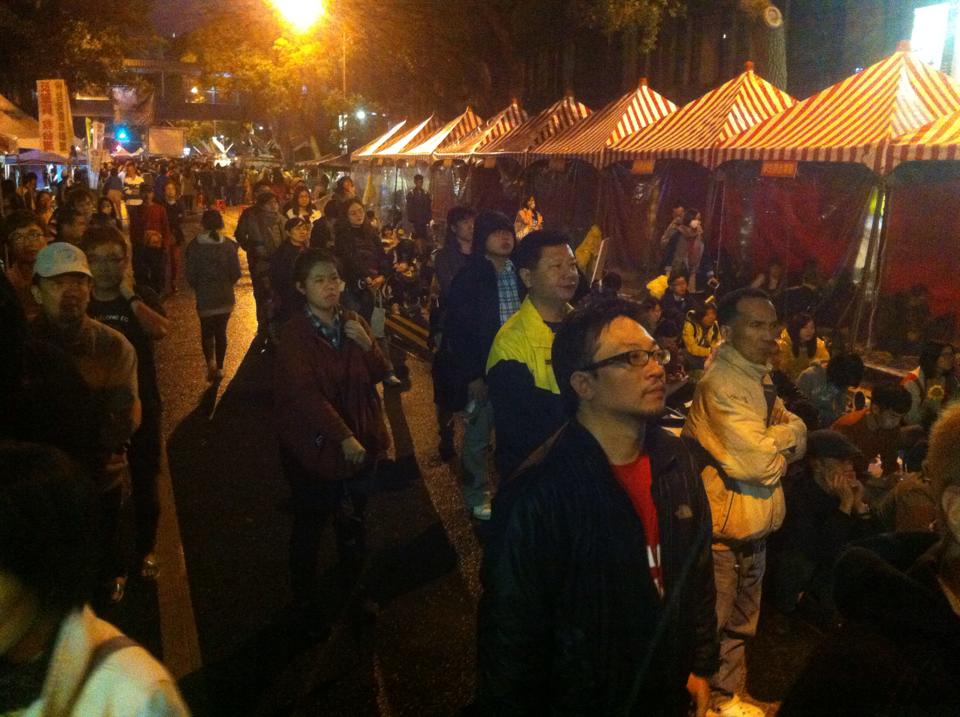 Crowd during the screening of I Have It Maid during the Sunflower Movement. Photo credit: I Have It Maid
Crowd during the screening of I Have It Maid during the Sunflower Movement. Photo credit: I Have It Maid
Even arguably a lot of the NGOs that do these rallies and so forth, are not very objective in their viewpoints, I think. With demonstrations about the issue in the past, often its just trying to yelling out about these core issues to people, without trying to explain these issues, without really trying to present them in a more laid out, unbiased process. Because they’re just screaming out of pain and frustration about the indifference, but they kind of want to, with all due respect, blame people rather than looking at the core issues. Which would be more beneficial in my opinion.
We kind of showed in the end of the film about these rallies. We pointed out that there are rallies going on every other year about this issue, but if you’re at them, like I have been several times, nobody knows what is going on. You ask the bystanders and nobody knows what they’re yelling about. The cars are being stopped in Zhongxiao Fuxing and they’re like, “What’s going on?”
Even then, whenever these rallies occur, the mass media never picks them up. Any other rallies that’s going on, they report on, they never report on this one. So there’s not only that factor, that it’s not reported on, but also just nobody knows why they’re marching down the street. “Why don’t they have a day off? Oh, our brokers told us that they didn’t need a day off, so what’s the issue?” Everyone’s confused.
Questions of Legal Reform: What is There to Change?
BH: Regarding that, if you hope to resolve the problem, who is the target audience of the documentary? Regarding legal reform, we talked about showing it to government workers. There’s also your notion that if you see these rallies once in awhile but don’t have context or information to look into the issue further, it’s not helpful.
AW: I mean, I’m going to bring it to the government, I’m not done utilizing my media contacts, but I have different friends who are willing to report on this topic, you know, in the China Times, Taipei Times, and other media outlets. Our main intention now is to get it into the media and get me and Nick out there, and whoever out there, to try and talk about this topic a little more regarding what we found. You’re kind of catching us at the beginning of this process, which we hope to do in 2015, because in 2014, we were just so busy trying to get the DVD out and finish production.
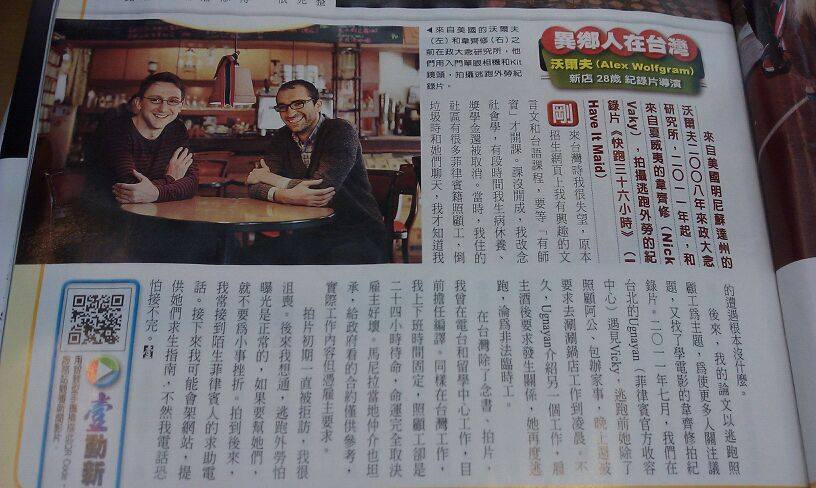 Magazine article featuring I Have It Maid. Photo credit: I Have It Maid
Magazine article featuring I Have It Maid. Photo credit: I Have It Maid
This will definitely be more of an activist-type approach we’re taking here. Again, I think, because the process took so much of efforts and time and money, at this point, I can only spend X amount of time contacting people and letting them know about it, that’s also a factor. That’s why we kind of appreciate news agencies like this taking interest and help do some more of the dirty work, so to speak. Because it is hard, we want to make a difference too.
When it comes to legal reform, when you have a couple of foreigners talking about these laws in Taiwan, I hope they take us seriously, that they take what is presented as factual stuff, regardless of who presented it. I don’t want to come across as the arrogant foreigner who thinks he knows everything, so that’s why we really try hard to present as much information as we could.
I think, too, the approach we’re going to take is show to the benefit legal reform can give Taiwan. My view is that Taiwan is going to be increasingly reliant on foreign labor, both in manufacturing and in the home sector. Especially in the manufacturing sector too, where runaway cases happen quite a bit as well. From an economic standpoint, the issue is based on a lot of competition from China and it’s going to be having to import a lot more labor. The companies are not able to use Taiwanese local labor anymore to compete cost-wise, and China is moving it’s facilities elsewhere.
I actually work in technology right now, so the trends I’m also seeing from these companies are saying that they just need the solutions. They are going to be pushing government organizations for higher quotas of foreign laborers that can come to Taiwan. I have no doubt that you’re going to see laws pass about that in the next year or two, and I think you’re going to see this constant influx of workers here. And I think it’s important that Taiwanese are aware of who these people are, what they’re doing, what are the laws that are regulating them, what should be their responsibilities with each, and that the process needs to be carried in a clear way. Just right now, it’s not in a clear way at all, there are too many loopholes. Clearing up these loopholes, I think Taiwan can be safer, and more stable.
BH: Can we talk about what type of laws would need to be changed? You raise several policy proposals at the end of the film.
AW: One thing in Taiwan you never hear about is runaway white-collar workers. I mentioned that in the film as well. The reason for this being that, simply put, regardless of what happens, white collar can just change employers. But blue-collar foreign workers aren’t allowed to change employers at will.
Even if there is one very basic law that can be passed which would have influence, it would be that the right to change employers at will. The brokers aren’t necessarily bad thing in my opinion. Why? I mean, I tell that to people and they kind of gasp, but most of these Filipinos come from rural areas where they don’t even know how to use a computer. They don’t have phones. They really have no way to even access information sometimes. They’re definitely a lack of knowledge of technology and ways of accessing information. So they’re heavily reliant on these systems. These systems aren’t going to go away anytime soon, I think.
The brokers can still take a fee, that’s fine, but they don’t need to take a fee every month, you know. Even English teachers over here pay an one-time fee and then you’re done. You don’t hear back from them. The fees can be reduced to an one-time thing. The brokers can still make the money, and the workers can make theirs. If they have an issue on their job, they should be able to present it, and make a decision to quit.
Of course, there are going to be consequences with that, as we have. If we quit our jobs, we have about a month to find another one, otherwise we have to leave. But I hope we can just basically bring the human rights of these blue-collar workers up to the white-collar level. Because we’re all foreigners in a sense, there shouldn’t be distinction between which foreigners are treated which way, which I think is really problematic. If the government can implement this regulation, I think there will be a huge decrease in the amount of runaways.
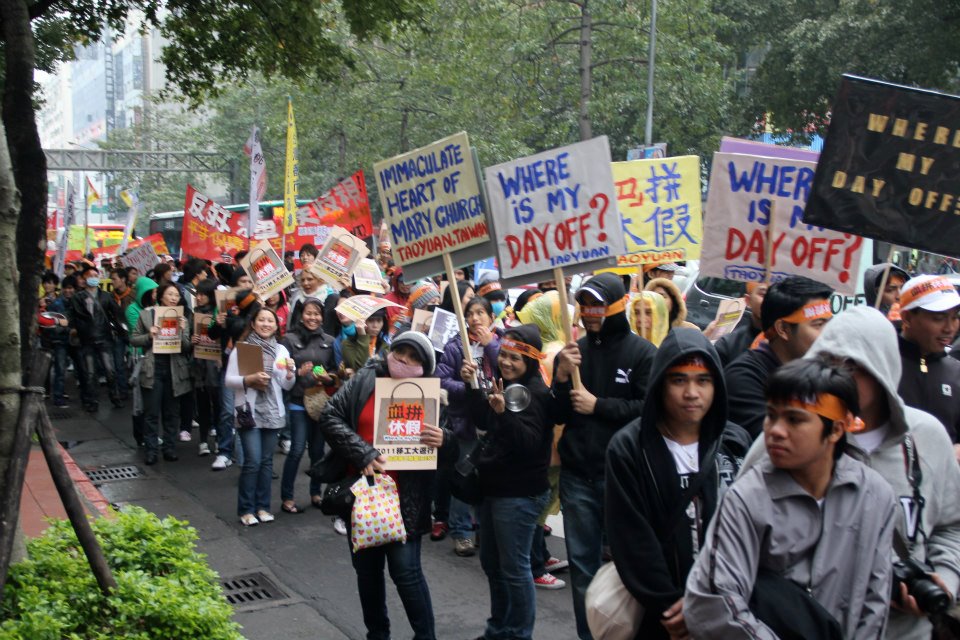 Migrant workers’ demonstration. Photo credit: I Have It Maid
Migrant workers’ demonstration. Photo credit: I Have It Maid
Because what can you run away from? The reason why there’s a runaway category is actually a product of government policy. The government wants to solve a runaway category but is actually producing it. The problem is produced by the policy, because by definition it does not allow these workers to change employers freely. What do workers do in a situation with all these loopholes?
They have to run. Essentially, it’s a dead end, the way it’s set up. If the government fixes it, it would be beneficial because they would have to spend way less resources on tracking these people down and it’d be much more monitored and so forth. So I think by just a few simple actions, we could definitely reduce this category to a very small amount.
Social Attitudes towards Migrant Workers
BH: Can we talk about the social attitudes of Taiwanese towards migrant workers, then? That there’s a culture of treating workers as if they’re on-call 24/7, don’t need days off, and that they can be asked to do all these things? For example, if it’s a moral issue about the treatment of foreign workers, is that one of the reasons for featuring a personal story in the film, would you say?
AW: Yeah, that’s one of the reasons why we put that in the film, absolutely. With the culture issue thing, that there’s this culture of treating foreign workers this way in Taiwan, I think the culture is largely based around the policy. Having an attitude towards these workers like that is based around a policy that influences the broker essentially to tell the employer what is going on. I don’t know if you had that impression from the movie, that’s kind of what we were trying to show.
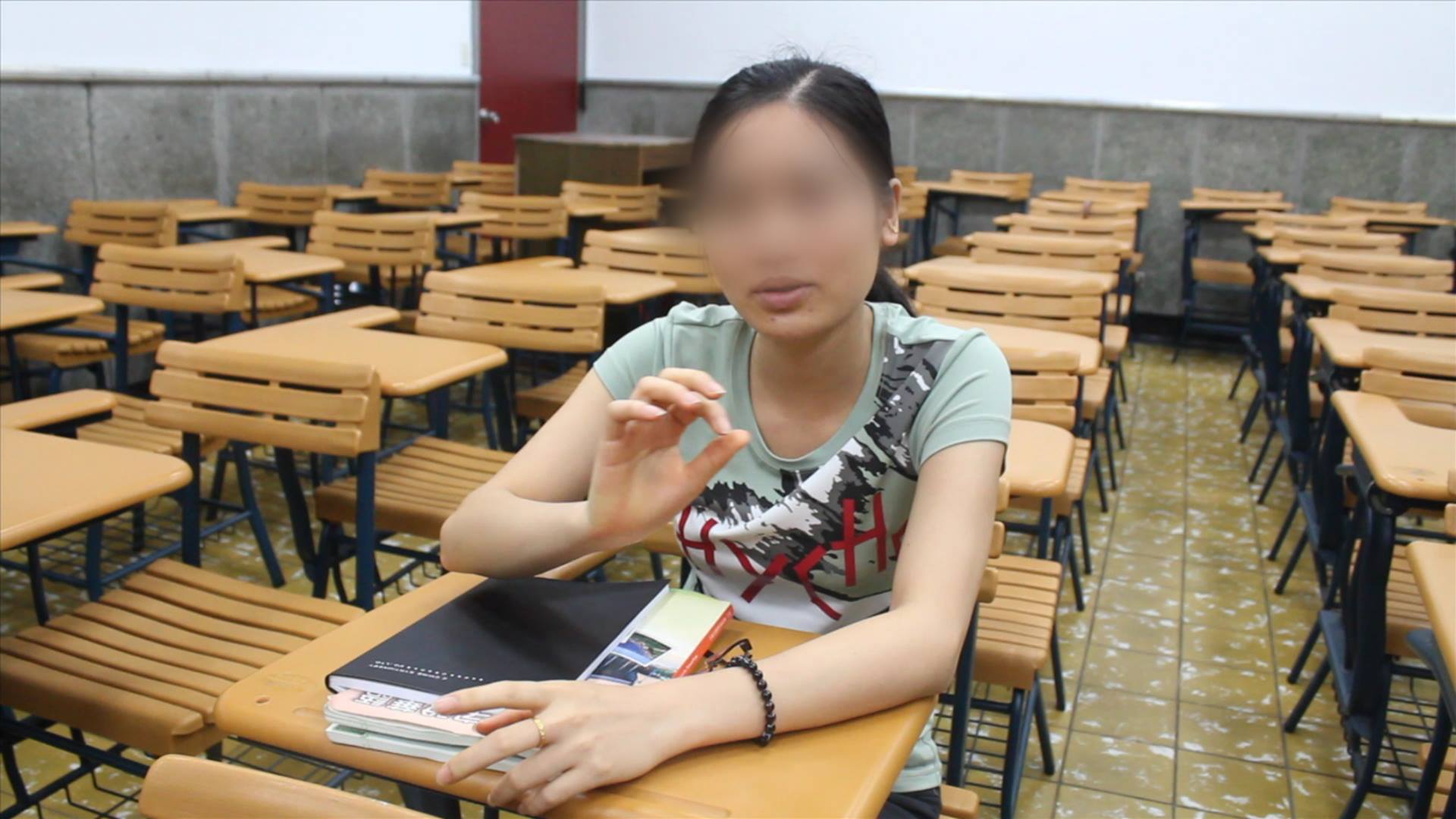 One of the runaway migrant workers interviewed in I Have It Maid. Photo credit: I Have It Maid
One of the runaway migrant workers interviewed in I Have It Maid. Photo credit: I Have It Maid
We also try to show people that, in the end, regardless of what government does or does not do, you have to have a change of heart. How would you treat other people? Would you treat other people the same way you would want to be treated? So we want to just try to get them to think. When you present them a story and people are like, “Oh, so that’s what’s going on,” they might think twice about how they’re going to treat this person regardless of whatever they’ve been told in the past.
I mean, we have all these brokers over here that are saying these workers are 24/7 on call, that they can do whatever the hell you want, so of course people are going to develop this kind of bossy attitude towards them that will extend even towards abuse. So when I look at Taiwanese, I don’t think of them as being bad, I think of them being misguided in these kind of situations, so we want to clear up the misguided aspects. That’s really the goal.
BH: Can you talk a bit about Vicky, then? I imagine you met her, then, the way you met the other Filipino workers with which you began the film. But how did you meet her and how did she become part of the film? How did it become that you decided to focus on her story in particular?
AW: So Vicky’s one of the first people that we met while going to one of these churches. Actually, she was the first runaway we met at the shelter we went to. Just from early on, I don’t know what it was, we just connected with her. She really opened up with us. I could tell she really wanted someone to talk and she really needed help.
We stayed in contact with her after finishing the film, and with this film, one of our goals we want to do with it is—she’s still in runaway mode. So, in addition, when I go to CLA, I’m going to push really hard for her case to be presented and to hopefully have any charges against her be dropped, so she can leave. Since she’s definitely faced with a lot of fines and penalties that will get rid of maybe all of the money she maybe saved up for the time she has to leave and probably prevent her from coming back to Taiwan—or she might get jailed.
And actually, we connected so much that when we went to the Philippines we traced her story back to her hometown.
BH: That’s right, you talked to her family in the film.
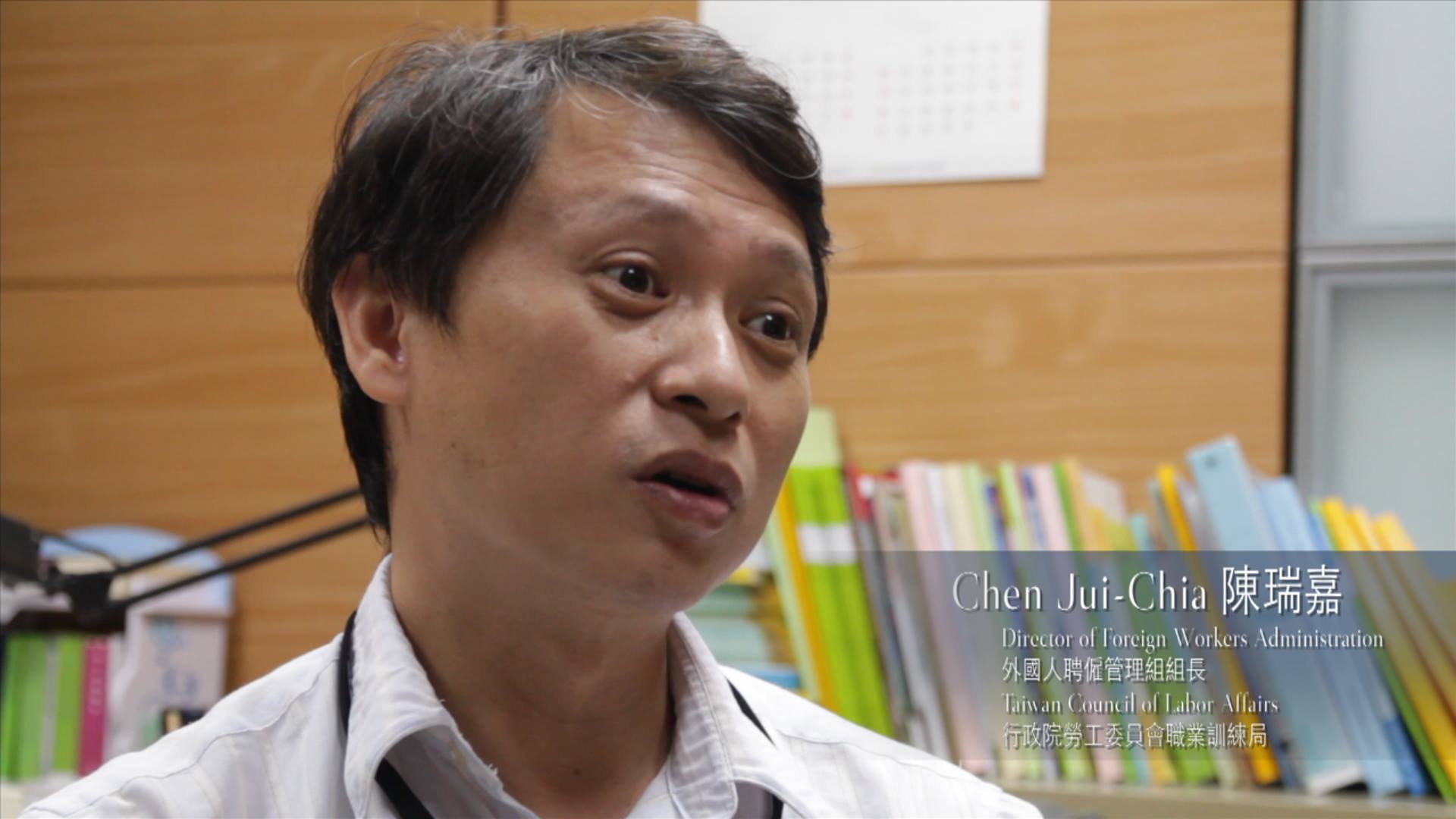 Chen Jui-Chia, director of the Foreign Workers Administration, was one of the Taiwan Council of Labor Affairs officials interviewed in I Have It Maid. Photo credit: I Have It Maid
Chen Jui-Chia, director of the Foreign Workers Administration, was one of the Taiwan Council of Labor Affairs officials interviewed in I Have It Maid. Photo credit: I Have It Maid
AW: Right, yeah. We’re still good friends and keep in contact. They were very nice. They were also very sad. You get to see the kind of the way it’s affecting the family. They come over here to Taiwan and it may seem like a really great thing because they can make more money. But the conditions aren’t good, and you see what are they sacrificing to be over here. There’s even this idea these workers are super lucky to come over here, to even get a chance to leave their countries…
BH: You mentioned in your film, that somehow the idea is that leaving their countries is the route to success. But you know, you have these kinds of situations.
AW: Right. One of the professors we interviewed even said too, “Yeah, you know, if they were given more jobs, more opportunities even, and the pay was better, they would stay, they don’t necessarily want to leave their families.”
Vicky has a daughter that she hasn’t seen for a number of years, but that she’s supporting simply just because she’s working over here, and sending money back, and she can’t leave. So everyone’s making up for some.
Next Steps after the Film: Taking the Bottom-Up Approach
BH: The last question I have for you, then, is what’s next for you? We touched on that at different points, the idea of still planning on advertising this film, of building up, of screening it and getting the word out more or less, but you also mentioned the past Kickstarter campaign which didn’t work out.
Are there plans to do future efforts? Another documentary, say? Or still trying to raise money? Or other ways to get the word out using this documentary or otherwise?
AW: We had debated about gathering funds for Vicky. To run a campaign that would help her save money. Due to legal complications with that, I don’t think we can do that, so we’re just trying our best overall to get the word out, bring it over to the government. Hopefully her case can be dropped so we can help her personally. And to start paving a path in which this issue can be solved, with more mass media attention.
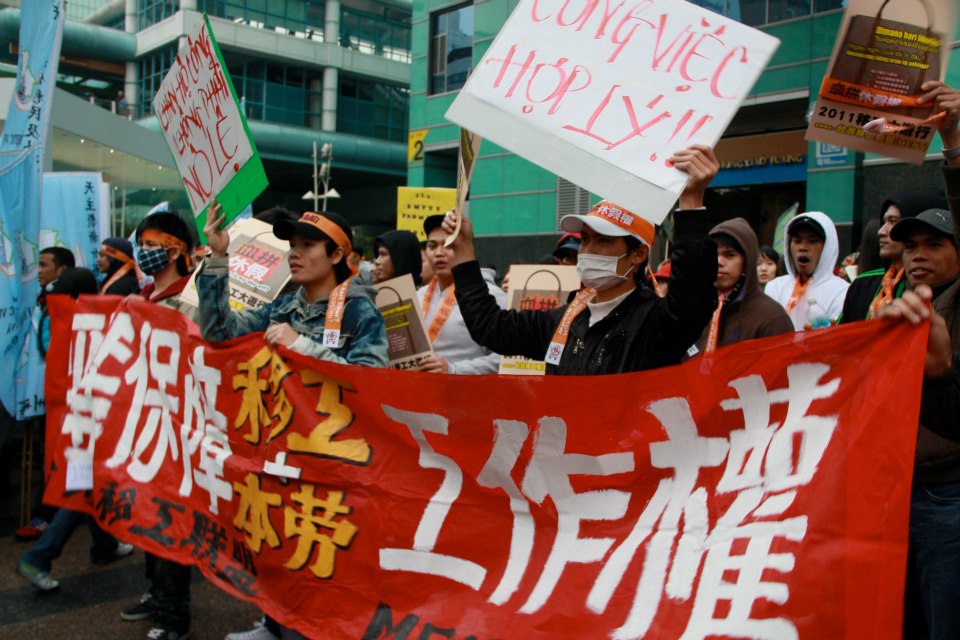 Migrant workers’ demonstration. Photo credit: I Have It Maid
Migrant workers’ demonstration. Photo credit: I Have It Maid
Once news gets out, you know—the government here is pretty good at changing some things at times, when the topic is in the right moment, and there’s enough media exposure, they really cave in, and they take consideration of what to do. At the very least, I keep saying this for a lot of interviews, but the goal is to kind of plant seeds, and to produce change in part.
Ultimately, regardless of what the government is or is not doing, people just need to take action for themselves, in their own lives and say, “Okay, this happening over here, but what is right? What should I be doing regardless of this policy or this situation? Are my actions going to be dictated by everything else that’s going on, or am I going to take a stance?”
Because you’re dealing with a huge institution over which we only have so much influence, we’re kind of taking more of a bottom up approach, which I think is a lot more appropriated for this topic as of now. I’ve seen a lot of people take the top-bottom approach and they’re faced with so much complications. They don’t present enough evidence to really convince the top right away. We’re trying to go from the opposite way. And that might take longer, but I think it might be more effective.










